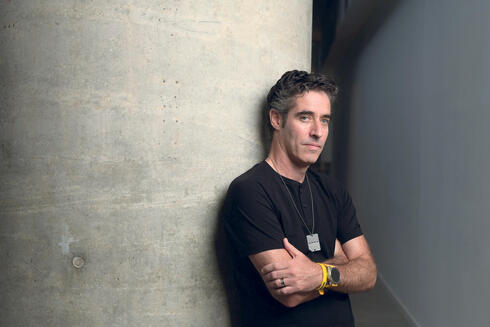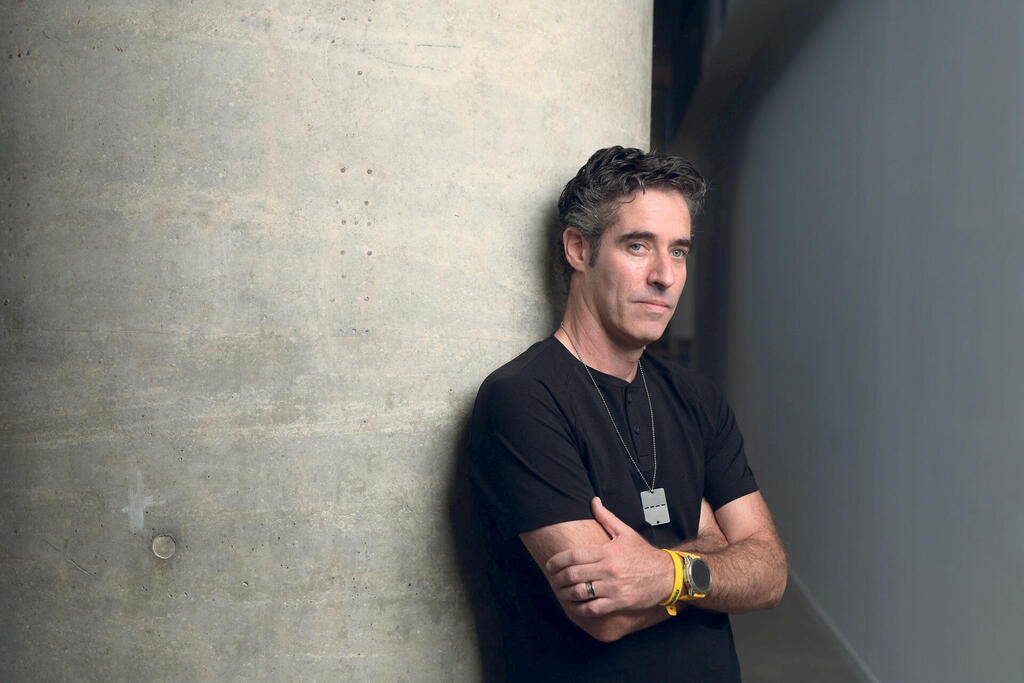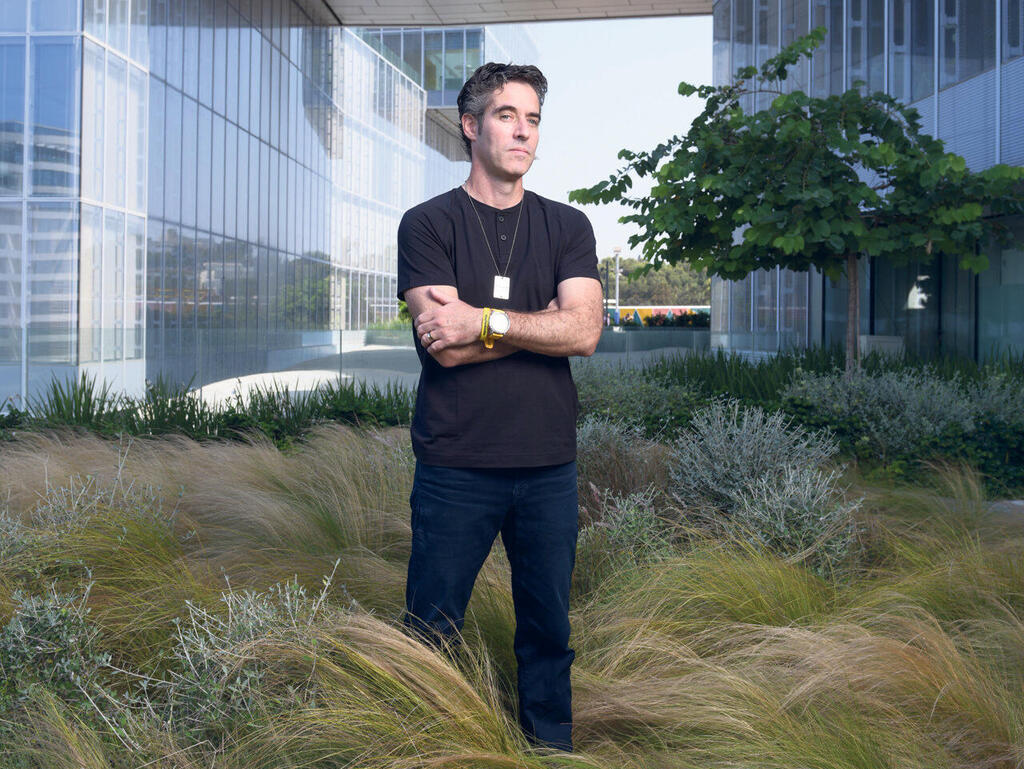
“I'd like Wix to become a $100 billion company”
Nir Zohar, President of Wix, which is traded at a valuation of over $8.5 billion, is optimistic the company is well-positioned to increase its profitability. He takes pride in its Israeli identity, is unafraid to express a clear stance on the fight for democracy, and has an optimistic outlook even after the events of October 7.
The last two years have been a roller coaster for Israeli company Wix. Once a rapidly growing business with a market value of $8.5 billion and thousands of employees both in Israel and abroad, Wix had to change its strategy as the high-tech sector demanded more focus on profitability and less on dreams of growth. This shift resulted in a sharp 75% decline in the company’s value, streamlining measures, and layoffs.
However, despite these business challenges, Wix maintained a clear and vocal stance on numerous value-based issues, in contrast to many companies that preferred to keep a low profile. During the war in Ukraine, Wix, which employed many workers in the country, took steps to help evacuate them, driven by a sense of shared fate. When the legal reforms began in Israel, the company publicly opposed the changes, allowing its employees to participate in protests and supporting the movement with donations.
Following the events of October 7 and in the subsequent months, Wix, like other companies in Israel, supported its employees who were called up for reserve duty. The company even granted them stock options worth tens of thousands of shekels and voiced support for efforts to secure the release of hostages. Through these turbulent years, Wix solidified its identity as a company committed to shaping Israel’s future—patriotic, but not neutral on issues that divide Israeli society.
Founded in 2006, Wix is led today by two key figures: Nir Zohar (47), who started as its Chief Operating Officer and later became the company’s president after its 2013 IPO, effectively managing its day-to-day operations; and Avishai Abrahami, the official CEO, who focuses on the company’s technological direction. Alongside Avishai, Wix was co-founded by his brother Nadav Abrahami and Giora Kaplan. This founding team has transformed Wix into a global leader in website building, with aspirations of becoming a $100 billion company.
"It's hard for me to know if our customers are avoiding or boycotting Wix. If someone chooses not to use us, they simply won’t. There have been some campaigns calling for general boycotts, including of Wix, but in our opinion, they were insignificant. As for public investors, it’s even more difficult to assess, as they’re unlikely to declare that they sold shares for ideological reasons or due to Israeli risks," Zohar explained.
According to Zohar, it has become clear that since early 2023, Israeli stocks traded in New York have diverged from other tech stocks. "American and Canadian stocks recovered more quickly from the downturn in the high-tech market than Israeli stocks. There seems to be a 'risk premium' for investors looking at Israeli companies. But we are an Israeli company, and that won’t change anytime soon. We will just have to navigate these difficulties."
Do you sometimes consider registering as a non-Israeli company?
"Not even for a moment. Difficulties are part of the journey. If we re-registered as an American or European company, we would face other challenges. We are very Israeli, proud of it, and not ashamed. Of our 5,000 employees, 3,000 are based in Israel. The support we’ve received from our Lithuanian and Ukrainian employees has been unwavering—through thick and thin, we've stood by our workers in Ukraine, where we have close to 1,000 employees, many of whom are now in Poland. Our connection with them comes from a sense of shared destiny, of fighting common enemies like Russia and Iran."
But you also have 500 employees in Ireland, where there has been a rise in anti-Israeli sentiment.
"I avoid making sweeping generalizations. For example, Ireland’s vote in favor of Israel at the Eurovision contest showed that the people act independently of the political atmosphere. We had only one incident where a female employee expressed a hostile opinion."
A worker who labeled Israel a terrorist state in a post. You responded swiftly and dismissed her.
"As leadership, we had no choice. We told her: ‘Posts like this don't belong here.’ She left voluntarily, and I respect that."
During the legal reform protests, Wix was critical of the Israeli government. Now, you find yourselves defending your Israeli identity.
"It’s the same value system guiding us in both cases. It’s the same moral compass we relied on in February 2022 when Russia invaded Ukraine, and we established a war room to evacuate workers from Kyiv. It’s the same principle that drives our efforts to support hostages' families and evacuated communities. We’re fortunate to have the resources to make a difference."
"When you have 3,000 employees in Israel, the war impacts you in many ways."
The war directly impacted Wix through hundreds of its employees. Kim, the widow of Daniel Alush, who was killed in the helicopter incident during reserve duty in Gaza, works at Wix. The uncle of Eden Yerushalmi, one of the six kidnapped victims who were murdered in cold blood, is a manager at the company.
"When you have 3,000 workers in Israel, the war affects you on multiple levels," says Zohar. "At one point, over 400 employees were on reserve duty simultaneously, and more than 600 had immediate family members serving in the reserves. The stress and anxiety were immense, with people needing support, both logistically and emotionally."
How did this affect you personally?
"Kim and Daniel's eldest son is friends with my younger son—they’re in kindergarten together. When I picked up my son that day, I told him that Tommy’s father had died in the war and wouldn’t be coming back. Having a conversation like that with a 4.5-year-old is surreal. The street looks the same, the sun is shining, everything seems normal, but nothing is normal."
Can you find any reasons for optimism?
"The resilience of the Israeli spirit in the past year gives me a lot of hope. Even during downturns, if you zoom out, it’s clear that in five years, we’ll be in a different place—after the war, rebuilding our systems. I also believe there will be political change because the public is eager for something different."
Zohar speaks from experience when he talks about falling graphs and the accompanying emotions. He had to deal with the stagnation in 2022 after years of unprecedented growth in the high-tech market. Wix, which had previously posted impressive results, saw declining forecasts, a slowdown in growth, and mounting losses. For instance, Wix’s operating loss grew from $200 million in 2020 to $325 million in 2021 before dropping to $285 million in 2022. With investors becoming less patient with growth companies, especially loss-making ones, there was little tolerance for extravagance, like lavish employee parties.
"You can mock us for being a bit hedonistic and for sometimes over-exaggerating our mission to change the world, but the work is really intense," Zohar says. "I went for routine health check-ups after turning 40, and the doctor asked me how many hours a day I work. I told him I’m not sure if there’s a time when I’m not mentally working."
During this time, Zohar and the Wix management were focused on one thing: cutting costs. In 2023, the company reduced operating expenses by $100 million. Revenues grew to $1.56 billion, and for the first time, Wix posted a positive operating profit of $40 million—a trend that continued into this year, with $38 million in operating profit in the first half of the year. The market rewarded Wix for this shift: since the beginning of 2023, its stock has doubled in value.
"To say that we didn’t understand the growth narrative earlier is hindsight bias."
Asked whether Wix should be criticized for being slow to adapt or praised for its eventual success, Zohar said the turning point came during the COVID-19 pandemic. "We operated under the assumption that we needed to hire aggressively, given the large influx of new users during the pandemic. But when the pandemic subsided, the market slowed dramatically. People left their homes and didn’t want to continue the behaviors they had adopted during COVID. That’s when we realized we needed far fewer employees."
Before 2022, you burned through a lot of cash.
"If we had been smaller and not prepared for the sudden spike in demand during the pandemic, it could have broken us. So, to say in hindsight that we didn’t realize the growth narrative was wrong is theoretical wisdom. In high-tech, you 'pour money into the machine' to build something big. Then, if the revenue growth is substantial enough, you justify future growth with profitability, and the market likes that."
But the market’s preferences changed. Investors started favoring profit-based stocks, and growth stocks took a massive hit.
"Yes, they were hit hard. Interest rates went up, people pulled their money out of the market and sold shares. Investors looked around and said they wanted to see who was making money. That was our turning point. We realized we were going to get hit by the storm, and we’d better brace ourselves. Some will overcome it, some won’t, and those who do will become better managers. Some companies won’t survive, but that’s the way the world works. We understood that we couldn’t continue the same way; we had to operate differently."
How did you shift toward profitability?
"We cut costs. We reduced some marketing and customer support teams and other roles that were less critical. We slowed down the growth rate of expenses. We shifted resources to areas that could generate revenue in the shorter term. We also reduced headcount. At our peak, we had 6,000 employees; now we’re down to 5,000. That’s significant. We also slowed our growth rate from 30% to 15% annually, but it’s still a very healthy growth rate."
So, where is Wix today?
"Today, we are a very different company from what we were two years ago. We’ve learned how to be more disciplined, more efficient, and more focused. We’ve become more resilient. We’ve shifted from a growth-first mentality to a profitability-first mindset. Our goal now is to continue growing profitably, and we’re well-positioned to achieve that."
Most customers design for themselves. Will that trend change?
"There will always be more self-creators—that's the reality of the world. The real question is: where will most of the revenue come from? Today, self-creators make up two-thirds of our customer base. However, we believe that over time, our partners—designers, web development agencies, and freelancers—will surpass them. This segment generates more commercial activity, with money revolving around the creation and development of websites for businesses."
To what extent do you use AI to save manpower and improve business efficiency?
"Customer service is the easiest example to understand. There are many AI agents embedded in the system. For instance, when you're building an online store and need to write product descriptions, we have an AI plugin that helps generate descriptions. Similarly, in the field of image processing, AI ensures the product looks great on the website."
Where will Wix be in the future?
"First and foremost, we will remain in Israel. We aim to employ more people and expand into new areas of business. I'd like Wix to become a $100 billion company, not just for the company itself but also for the impact it would have on the Israeli economy."
Is there anything you would ask of the Israeli government to keep you here?
"Nothing. I only ask that the elected representatives of the people reflect the will of the people. The ultra-Orthodox community must integrate into the workforce and the army because we have no choice—simple math shows this situation can't continue. This is a difficult political issue that needs to be resolved through equality, ensuring equal rights and responsibilities for all parts of Israeli society."
"You don’t need to apologize for a healthy working relationship."
Avishai Abrahami, co-founder and CEO of Wix, first met Nir Zohar when Zohar was just 13 years old, through his older brother, who served under Abrahami in Unit 8200. Zohar often hung around his brother and his army friends, which is also how he met Giora Kaplan, Wix’s co-founder.
Avishai Abrahami and you are seen as complete opposites. How does that dynamic work?
"Why should we apologize for having a healthy working relationship?" Zohar asks. "We've known each other for years and understand each other's strengths and weaknesses without trying to exploit them. Each of us compensates where the other is less strong. I'm more of a frontman, while Avishai is the 'mad scientist.' It works well for us. On a personal level, I try to stay involved in current events and exert influence outside of Wix, while Avishai is less interested in that."
Have you ever had conflicts in the past?
"Once, he moved ahead with something while I was on vacation. I sent him an angry message, telling him it was a mistake and that I was disgusted with him. He replied, 'We’ve been together for so many years; this is a small issue—not a good enough reason to be angry.' I shot back with a juicy curse, telling him he gets on my nerves sometimes, and he was right, especially when I get fixated on something. The balance between us is knowing how to handle each other's emotions. When one of us is angry, sometimes you just let it pass, and sometimes you tell the other to stop."

















